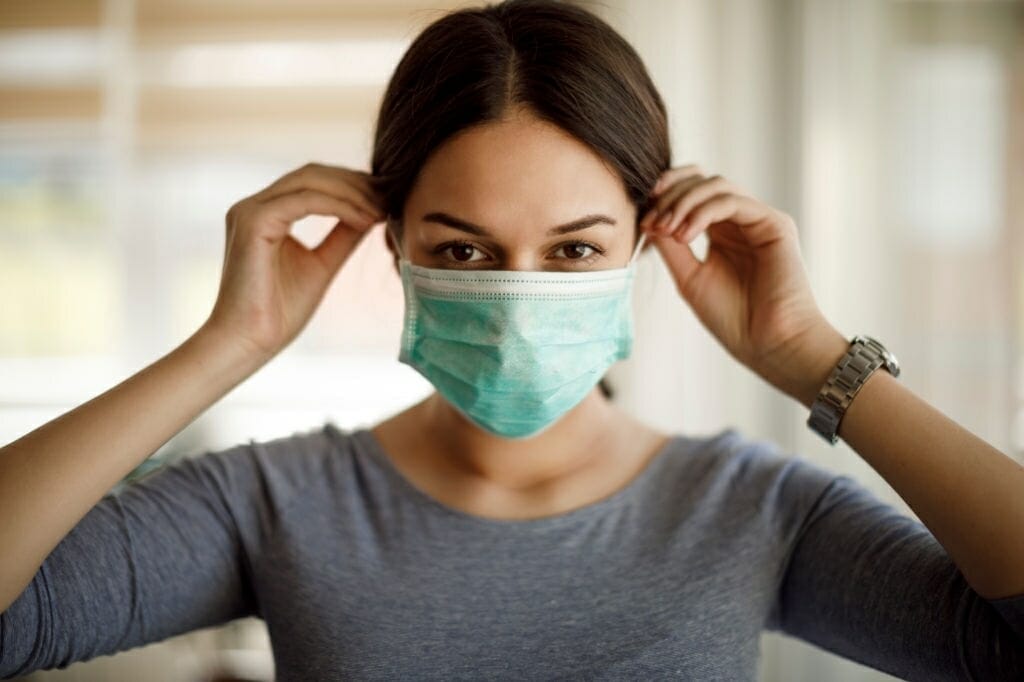Face masks develop an occlusive (closed) environment, which increases the level of moisture in the area around your skin.
If you’re wearing a mask for a short length of time, such as when grocery shopping or during a doctor’s visit, the additional moisture isn’t much of a problem.
However, when a mask is worn for several hours, the extra moisture can cause breakouts and skin irritation on the nasal bridge, chin, and cheeks.
If you have a history of acne, rosacea, perioral dermatitis, eczema, or allergic contact dermatitis, using a face mask for an extended period may aggravate the problem.
The elastic bands of the mask might cause discomfort or chafe behind the ears of certain people. Keeping your skin clean and moisturized is the most essential thing you can do to avoid more skin problems.
Here’s what to do to avoid skin problems if you wear face masks.
1. Cleanse and Moisturize Your Face Daily
Skin problems can be avoided with gentle skincare. Use a gentle, fragrance-free cleanser while washing your face. A frequent face mask skin problem is usually dry skin.
Moisturizer gives a protective layer to the skin, which can help to decrease dryness. If you’re worried about breakouts, choose a moisturizer made specifically for your skin type.
2. Protect Your Lips by Applying Petroleum Jelly
Some common face mask skin problems include chapped lips and dry skin. Applying petroleum jelly to your lips can help prevent chapped lips. Use it:
- After you’ve washed your face
- Before you put on your mask
- Before going to bed
Make sure you only use petroleum jelly on your lips to avoid outbreaks.
3. When Wearing a Mask, Don’t Bother with Makeup
Makeup is more likely to clog your pores and cause breakouts when worn under a mask. If you must use makeup, look for items that are labelled “non-comedogenic” or “won’t clog pores.”
4. Try Not to Experiment with New Skincare Products that May Irritate Your Skin
Even if you only use a mask for a few minutes, it might make your skin more sensitive. To prevent skin problems, avoid using harsh cosmetic products for the first time, such as a chemical peel, exfoliator, or retinoid.
5. Wear the Right Mask
Look for masks that have the following features to help prevent skin problems:
- A tight yet comfortable fit
- Fabric with at least two layers
- On the interior layer that lays against your skin, a soft, natural, and breathable fabric, such as cotton, is used
Wearing a mask that fits snugly but comfortably protects you and others from the coronavirus is recommended. A tight fit across your nose, sides, and beneath your chin is ideal.
It’s also important to consider the fabric. On the layer that rests against your skin, avoid synthetic fabrics like nylon, polyester, and rayon. These are more prone to irritate and trigger breakouts on your skin.
6. Take a 15-minute Mask Break Every 4 Hours
On the front lines of the coronavirus pandemic, health care professionals have discovered that taking mask breaks helps save their skin. Remove your mask only when it’s safe to do so and after you’ve washed your hands.
The following are safe places to remove your mask:
- When you’re outside and can keep at least six feet apart from other individuals
- When you’re alone in your car
- In your house
7. Wash Your Cloth Masks
Washing a cloth mask after each usage is now recommended by several health care organizations. Washing removes any oils or skin cells that have accumulated inside the mask, which could cause a skin problem.
A cloth mask can be washed in the washing machine or by hand. Both methods are effective in removing bacteria and other debris. Just remember to:
- Wash each mask according to the instructions on the packaging
- Unless the instructions state otherwise, wash the masks in hot water
- Use a hypoallergenic, fragrance-free detergent
Examine the shape of your mask after it has been washed. A mask is less protective if it no longer fits snugly (and comfortably).
All In All
Apply a good barrier ointment to your face, especially around the region where your mask will be worn. We recommend applying it 30 minutes before putting on the mask.
This will help to keep the skin from drying out and breaking. Also, follow the instructions about when to change your mask.
The rules for various masks are varied. If you’re concerned about forgetting, set a timer on your phone to serve as a reminder.
Furthermore, if you’re looking to produce and market your cosmetic OEM products, get in touch with us, your trusted cosmetic contract manufacturer to help develop your products according to your specifications.

